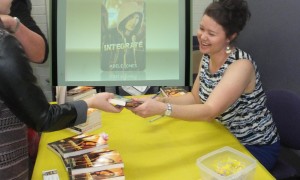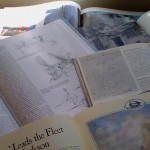Did you know it’s ‘International talk like a pirate day’? I’m sure there are thousands of, ‘Arrrrr,’ type comments being made across the world in keeping with the fun of this date, and perhaps a lovely buzz is building for all things maritime.
Having written a historical maritime novel (A Devil’s Ransom) I have a great deal of affection for the nautical, but today I’d like to take a slight tangent to this theme. That is, the dynamics of a ship’s crew.
Now, I promise this is related! Last weekend marked the official book launch celebrations for my new YA novel Integrate. It was a wonderful event shared with many others who have supported me throughout the publication journey or have heard of the book and wanted to share the excitement of its release. But this day could not have happened without the many hands that managed all the behind the scenes work. My writing group. (Not to mention those involved in seeing the book to publication prior to that!)
 On the morning of the launch my husband was given several chores to do while I zipped out to finish getting ready. When we finally arrived at the venue, I could feel fissures of stress edging through me. With a zillion thoughts in my head, including a list of what yet had to be done, I was stopped in my tracks as I stepped into the room. It was perfect. Everything had been set up and there was an atmosphere of calm as my writing friends went about their business – tasks they had previously delegated between themselves. Upon asking after a few items on my mental list, I was met with a smile and reminded that people had already offered to do these things, and had.
On the morning of the launch my husband was given several chores to do while I zipped out to finish getting ready. When we finally arrived at the venue, I could feel fissures of stress edging through me. With a zillion thoughts in my head, including a list of what yet had to be done, I was stopped in my tracks as I stepped into the room. It was perfect. Everything had been set up and there was an atmosphere of calm as my writing friends went about their business – tasks they had previously delegated between themselves. Upon asking after a few items on my mental list, I was met with a smile and reminded that people had already offered to do these things, and had.
I felt something like the awe I hold when watching a ship’s crew at work – especially a sailing ship. Each crew-member knows their task and the importance of performing it well. If they don’t, they not only let themselves down, they risk jeopardising the safety of the ship and the souls aboard. There is something quite magnificent and equally intriguing about the team work involved in performing evolutions (or manoeuvres) under sail. Considering the physics of a sailing ship and the forces acting on it, the precision of this work can be appreciated.
The same applies to life. At times we can lose sight of our efforts in the bigger scheme of things, but don’t become discouraged in doing the little things well. No matter what moment we are in, there are always many hands that have seen us, supported us, to our ‘now’. From the simplest word of encouragement to meeting an overwhelming practical need, each hand bears a little weight in life’s journey. Let’s never undervalue the power of supportive hands in our world – and our part as a ‘crew-member’ for others.




